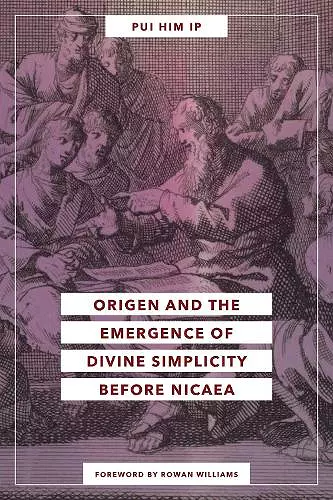Origen and the Emergence of Divine Simplicity before Nicaea
The role of divine simplicity in early Christian thought
Format:Hardback
Publisher:University of Notre Dame Press
Published:15th Nov '22
Should be back in stock very soon

This work presents a historical perspective on divine simplicity's role in early Christian Trinitarian thought, particularly before Nicaea. Origen and the Emergence of Divine Simplicity before Nicaea offers valuable insights for theology students.
In Origen and the Emergence of Divine Simplicity before Nicaea, the author explores the intricate relationship between the doctrine of divine simplicity and the development of a Christian understanding of the Trinity prior to the Council of Nicaea. The book delves into how, for centuries, Christian theologians maintained the belief that God is both simple and Triune. However, this idea faced significant challenges from modern critics who question how a singular, simple God can also embody a Trinity. By tracing the historical roots of divine simplicity within early Christianity, the author provides a fresh perspective on this theological debate.
Pui Him Ip makes a compelling argument that understanding divine simplicity requires a grasp of the Platonic synthesis between the Good and the First Principle. This philosophical framework, according to Ip, helps clarify why divine simplicity rejects any notion of plurality that could imply contradictions within the divine essence. The book emphasizes the importance of this doctrine in shaping how early Christians articulated the relationship between the Father and the Son, thus establishing a foundation for later Trinitarian thought.
Through a thorough examination of historical figures like Irenaeus, the Monarchian controversy, and Origen’s writings, Ip highlights the significance of discussing the begetting of the Son from the simple source of the Father. This exploration reveals the complexities that early theologians navigated, setting the stage for the ongoing discussions about the Trinity that would follow in the fourth century. Origen and the Emergence of Divine Simplicity before Nicaea is an essential read for those interested in the evolution of Christian theology and its historical context.
"The attentive reader will find in these pages persuasive, careful arguments based on detailed analyses of the relevant texts. This study . . . is as useful as an introduction to ancient philosophical theology and methods of its study as it is as a contribution to scholarly understandings of the numerous individual passages, figures and broader narratives it engages." —Scottish Journal of Theology
"Ip's lucid and surefooted book provides an historical and conceptual anchorage for any future discourse on divine simplicity, giving the doctrine a more human and concrete face, and enabling a new flexibility in addressing the formidable conundrums it poses." —Reviews in Religion & Theology
"Ip’s elegant discussion of divine simplicity in pre-Nicene theology helps us to see with new clarity the diversity of ways this doctrine was articulated, and the functions it performed. By showing us this rich diversity, Ip also offers further arguments for taking the doctrine seriously as an integral and important part of the Patristic heritage. Students of Trinitarian theology, of Irenaeus, and of Origen will all need to come to terms with Ip’s work." —Lewis Ayres, author of Augustine and the Trinity
"Readers will find the discussion of Origen's relation to the Platonists of his time especially valuable in its erudition and its conceptual sophistication. This book is a contribution, not only to patristics, but to the history of philosophy." —Mark Edwards, author of Christians, Gnostics and Philosophers in Late Antiquity
“This impressive study offers what I think is the very first genealogy of Christian usage of the idea of divine simplicity up through Origen of Alexandria.” —Andrew Radde-Gallwitz, author of Gregory of Nyssa’s Doctrinal Works
"A good example of careful historical work and a valuable contribution to understanding the development of the Christian teaching on the Trinity. Moreover, the book charts some ways forward for better understanding how Trinitarian theology developed from the third century into the fourth. Those interested in early Christianity, historical theology, and systematic theology will gain insight from this book."—Journal of Theological Studies
"The author’s way of presenting his research has the great advantage that it makes the positions clear and provides a good insight into the sources. Many authors could learn a lesson from Pui Ip’s way of presenting his research. If there are more details to add to the picture—and there probably are—Ip puts the reader of the book in a very good position to dive deeper into the sources to discover more details of this important theological theme."—Modern Theology
"This is an important study that historians of doctrine as well as scholars in systematic and philosophical theology will read with profit." —Church History
"...a truly impressive piece of work, one that unites careful historical work with broader systematic considerations to great effect. Ip’s scholarship is certainly one to watch." —International Journal of Systematic Theology
"While at times the argument unfolds in a patchwork manner, Ip sews all the pieces together into a fascinating theological tapestry. Origen and the Emergence of Divine Simplicity before Nicaea is a first-rate study of an ironically complex doctrine." —Reading Religion
ISBN: 9780268203610
Dimensions: 229mm x 152mm x 18mm
Weight: unknown
298 pages